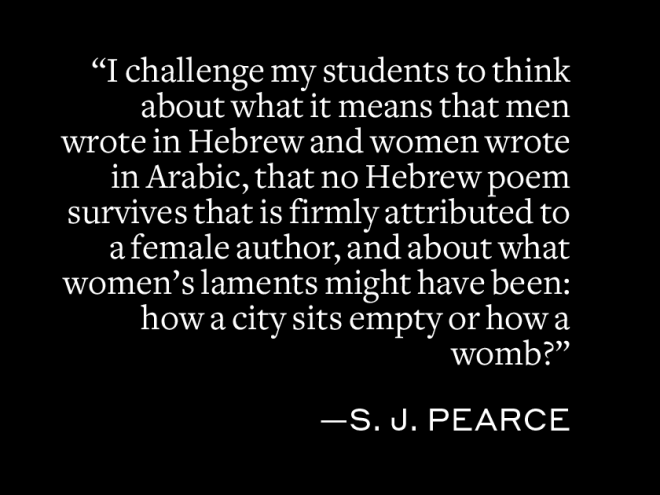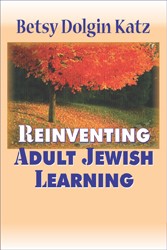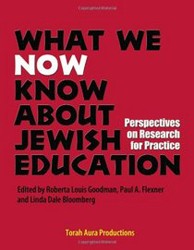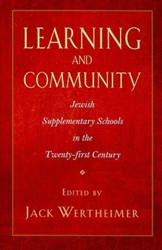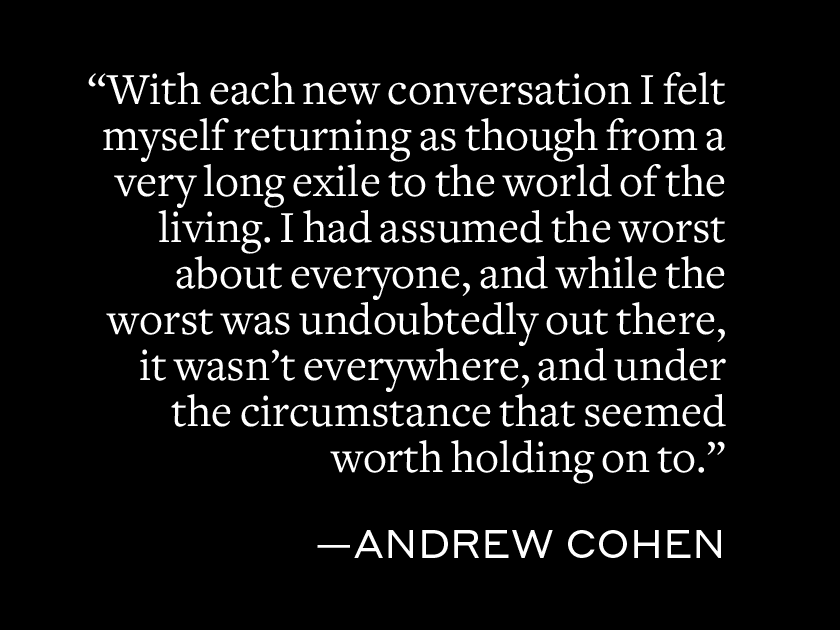
This piece is part of our Witnessing series, which shares pieces from Israeli authors and authors in Israel, as well as the experiences of Jewish writers around the globe in the aftermath of October 7th.
It is critical to understand history not just through the books that will be written later, but also through the first-hand testimonies and real-time accounting of events as they occur. At Jewish Book Council, we understand the value of these written testimonials and of sharing these individual experiences. It’s more important now than ever to give space to these voices and narratives.
In collaboration with the Jewish Book Council, JBI is recording these pieces to increase the accessibility of these accounts for individuals who are blind, have low vision or are print disabled.
When the email arrived inviting faculty, staff, and students at the community college where I’ve been teaching for twenty-three years to a viewing of The Palestine Exception, a film that tells the story of students and faculty across the United States who have “mobilized for justice in Palestine” and “aims to embolden those who refuse to be silenced by this new era of McCarthyism,” I felt first the rush of angry adrenaline I often felt watching videos of masked anti-Israel protesters; and then the impulse, rooted in the conviction that I shouldn’t waste my time on another hit-job against Israel, to delete the email; and finally, understanding as I did that as one of a few Jewish professors at my college, and almost certainly the only one with a connection to Israel, I’d have to attend the event, a weary resignation. But I also felt relief, because though our college had seen none of the campus chaos so common around the country in the aftermath of October 7; though the sum total of what I’d had to confront at work over the past twenty months were a couple of keffiyeh-wearing students in my classes and a tone-deaf but not especially offensive email that went out from our Union a few weeks after October 7th, I’d sensed the anti-Israel vitriol everywhere: beneath every reference to “social justice,” behind every anti-Trump screed, over every casual conversation with colleagues about summer plans during which I didn’t mention our plans to travel to Israel. The silence felt stifling, unbearable, my sense of alienation profound; I felt endlessly braced for someone to say or do something that would demand my response. In this context, the prospect of finally facing it head-on, of having it out in the open, making myself known at long last, felt like a genuine relief.
But I’d be lying if I said I wasn’t worried.
______
I wasn’t afraid of a confrontation (in fact, recently at a neighborhood coffee shop I had turned to two people talking loudly about how “Zionists were the worst,” and said, “I’m a Zionist, and if you’re going to talk about me in public, I’m going to feel free to respond.”), and though it was easy enough to imagine swastikas showing up on my office door or a parade of masked students disrupting my classroom or worse once word got out that I was a Zionist, for the moment, at least, I wasn’t worried about physical dangers. Nor was I worried about my job security, seeing as I have the equivalent of tenure. What worried me was that this was my place of work, where I’d long prided myself on being upstanding, dignified, responsible — where, in contrast to so many of my colleagues in recent years, I didn’t believe that I should bring my politics. And the idea of putting myself out there in this way ran counter to everything I believed about professionalism and my responsibilities as an academic. Moreover, I knew how raw I felt after twenty months of isolation, how intensely I had come to feel about Israel, the war and being Jewish, and I worried that if I got provoked enough I might say something extreme — and that in doing so, I would risk becoming the type of person I never wanted to be.
In the days leading up to film screening, I worried endlessly about whether or not to go, and what I might or might not say if I did. Nor was I the only one. My mother, eight-seven and as anxious a person as ever set foot on this earth, beseeched me “not to look for trouble.” And my teenage sons told me not to “do anything crazy.” More than once I thought I should skip the event, do something fun, life-affirming instead. What difference would it make if I went? I wasn’t going to change anyone’s minds or shift the discourse in any meaningful way; almost certainly I’d end up feeling worse afterwards. But whatever fears I had of what might come was lost beneath the desperation of what I had been living with.
______
Outside the viewing room sat two colleagues with whom I’d had long cordial professional relationships, one who was signing people in and the other who would be moderating the post-film discussion. Our greetings were friendly, ordinary, but the tension between us felt as palpable as it did sudden. Inside the room I felt greater trepidation. Thirty or forty people milled about enjoying snacks from the Middle East, including a few women in Hijabs, a Palestinian American psychology professor whom I knew in passing, a couple of administrators, a long-time sociology professor who it was all too easy to imagine wearing a keffiyeh to her classes; I felt surrounded by people who didn’t want to understand me, and I instinctively took a seat near the door with my back to the wall.
The film itself featured a familiar cast of characters: the high-brow Judith Butler waxing on about the moral stain that was Israel, the Jewish Voices for Peace woman who said she’d been “betrayed” by all the “lies” she’d been force-fed at Jewish summer camp, the son of the late Edward Said who repeatedly referred to “the Zionists” with disgust. All of this was predictable, boring, almost, as was the one-sided account of the conflict, the absence of any mention whatsoever of October 7th or the hostages, the repeated suggestion that the “the Jewish lobby” was responsible for the crackdown on the protests, and the endless insistence that anti-Zionism was not antisemitism. As I watched, I had the same experience I often have observing the protesters — the overwhelming temptation to laugh, to dismiss them as unserious, absurd, not worthy of my time or energy, and, almost simultaneously, the frightening recognition that whatever they were serving up was being devoured by masses of people around the world, with increasingly lethal consequences. I had to say something, but what?
I knew that whatever I said had to be spoken quietly, dispassionately, as though I had no real investment in the matter; any hint of agitation let alone anger would sound defensive and be dismissed accordingly. I thought I could say that JVP was by any measure a fringe group within Judaism, and that to feature them in the film at the expense of any other Jewish perspective seemed misleading and irresponsible. Alternatively I could suggest that the premise of the film — that the protesters had somehow been silenced — seemed genuinely bizarre in light of the chaos that had unfolded on campuses over the last eighteen months. Or maybe I could point out that the film traded in troubling, dangerous stereotypes about Jewish power and influence. But no matter how calmly I imagined speaking, all of it sounded defensive, typical, almost certain to confirm everything they believed about me, about us.
I considered taking a softer, more personal approach instead. I remembered hearing Dara Horn once say that when she speaks about Israel to non-Jews she always starts with the idea of a homeland because everyone can connect to this idea, and I wondered if this might work. Or maybe I could point out that the film seemed unnecessarily inflammatory, that as such it would do nothing for the cause of peace that presumably we all cared about. Or I could go the other way entirely and simply say, “I am a Zionist. I teach here. I care about my students as much as any of you,” and leave it at that.
It wasn’t just that I felt like I had to say something. I felt like I had to say the right thing, the unassailable thing, the perfect thing. But the more I tried to come up with something, the more futile it seemed. Everything had already been said, argued and counter-argued, so many times that nothing would break through in any meaningful way.
As the film ended, I decided to simply say that if the film’s intent was to explore the debate over free speech it would have had to explore the impact of the protests on Jewish students since that was the nature of the debate: where one person’s freedom impinges on another’s. This seemed reasonable, inoffensive, and balanced, something any thoughtful person could agree with.
And it would also make it clear that there was at least one person on this campus who saw things differently than the film presented and so much of the world publicly agreed with.
______
When the discussion began, I waited to raise my hand, lest I seem overly eager. I listened as the director noted that her primary goal with the film was to “lift up marginalized voices,” which I found hard to take at face-value given the film’s provocative nature and how little it focused on the suffering of Palestinians. Then the Palestinian American professor spoke about the hardships of growing up in East Jerusalem and the devastation of the current war. Though her repeated references to “the genocide” irritated me, I was touched by her story, so much so that I was almost inclined to forgo saying anything: I had no disagreement with her experience, after all, and didn’t want to say or do anything that might suggest otherwise.
Then a woman in the audience spoke about her frustration at being accused of antisemitism whenever she criticized Israel, to which the director said, “That’s one of the ways they silence people.” This was followed by an extended back and forth about what constituted antisemitism, none of which was new to me, and some of which I honestly couldn’t object to. But something about being in a room full of non-Jews talking so animatedly, so freely, about this provoked an uproar inside of me, and my hand shot up seemingly of its own accord.
“Don’t do anything crazy, Pops,” I heard my sons’ caution, as I waited to be called on, and when I was, I steadied my voice as best I could. “First, I want to say that I have a lot of respect for my colleagues who helped organize this,” I said, acknowledging that I especially appreciated the perspective shared by the Palestinian American professor. “I have something I’d like to say about the film,” I continued. “But first I wanted to say that as a Jew, probably the only one in this room, I’m pretty surprised at the nature of this conversation.” I noted how for years our college — colleges and people advocating for social justice across the country — had taken the position that we needed to approach discussions of racism, bigotry, and prejudice with humility, to leave our assumptions at the door and instead be guided by those on the receiving end of things. Yet here was a group of non-Jews who seemed perfectly comfortable defining where antisemitism begins and ends. “I’m hard-pressed to imagine such a conversation happening with regards to any other minority at this college,” I said. And then: “To the extent we’re talking about exceptions here today, this would be a worthwhile one to explore.”
The room went very quiet, and I waited, heart thumping, for what might happen next. Then, because I still had everyone’s attention, I made my point about free speech.
The response was as almost as predictable as the film — there were deflections, explanations, genuinely weird remarks. The director said her definition of antisemitism was based on “the research.” A young woman in the audience declared that she wasn’t antisemitic. A staff member, looking at me, suggested it was natural for people to feel defensive when confronted with “difficult truths like genocide.”
No one mentioned academic freedom or the inconsistency I had pointed out.
As I listened, I was tempted to quibble, clarify, justify argue: to ask the director to account for “the research” she’d referenced; to point out that I hadn’t accused anyone of being antisemitic; to tell the staff member that her response seemed to reflect the very defensiveness she was accusing me of; to tell everyone that I actually didn’t object to a thoughtful discussion about the definition of antisemitism, so long as we could have the same kind of discussion about all forms of bigotry. The thing is, I was feeling so good about what I’d said, such deep relief, joy, even, of the kind that arrives on those rare occasions when you speak a truth in just the way it needs to be spoken, that I really didn’t want to ruin the moment. Instead, after a few minutes, I got up and left.
As I stood in the afternoon sun, I breathed more easily, it seemed, than I had in a very long time. I sensed what an enormous toll the alienation, the silence, of the past two years had taken on me. And it occurred to me that the power of speaking the truth isn’t always about being heard, let alone understood, that there’s merit, relief, freedom even, simply in the act of speaking. All of which would have been dayenu, enough for one day, as far as I was concerned, though the story doesn’t end there.
The next day I was invited for coffee by my colleague who had facilitated the discussion during which, after I spoke about my perspective on the film, my complicated feelings about the war, my experience at work these past couple of years, he confessed his misgivings about the film and frustrations with trying to introduce nuance into the discussion. When we said goodbye, I felt like he was no longer just a colleague but also a friend.
The following week I received another email — this, from the sociology professor of all people, who, it turned out, had also been part of the planning committee. She said she’d been thinking about me, that she was sorry that my “brave remarks” had gone unaddressed and that she hadn’t done a better job of creating an “inclusive space.” I wrote back that she didn’t need to apologize — that I felt good about how it had gone, but that I really appreciated her email, which I did.
And it didn’t stop there. Days later at my son’s track meet, I ran into a philosophy professor who said he was growing concerned with the one-sided activism of our Union, which led us to a rich conversation about Israel and what it was like for me to be Jewish on campus. That evening I received an email from my colleague who’d been checking people in before the film, asking if I’d be willing to meet, as she realized “how much she has to learn about the subject.”
It was as though in speaking I’d stepped through some kind of portal to a place where sensible people roamed, people from whom I didn’t have to hide what I thought for fear they would start screaming slogans or shunning me or worse. It wasn’t that they shared my views about Israel, or were somehow on “my side,” but rather that they shared my belief in respect and complicated realities. With each new conversation I felt myself returning as though from a very long exile to the world of the living. I had assumed the worst about everyone, and while the worst was undoubtedly out there, it wasn’t everywhere, and under the circumstance that seemed worth holding on to.
The views and opinions expressed above are those of the author, based on their observations and experiences.
Support the work of Jewish Book Council and become a member today.
Andrew Cohen lives in Portland, Oregon, with his wife and two sons. His essays have appeared in journals such as Alaska Quarterly Review, Zyzzyva, Michigan Quarterly Review, Colorado Review, and The Missouri Review, where he received the Editor’s Prize.
